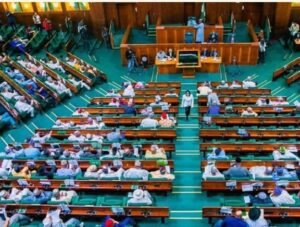Lawmakers Demand ₦480 Million from Universities for Approval of 2025 Budget
Lawmakers Demand ₦480 Million from Universities for Approval of 2025 Budget

In a concerning new development, certain lawmakers within the National Assembly have reportedly devised a scheme targeting federal universities and other higher learning institutions, demanding significant bribes in exchange for approving their 2025 budget allocations.
Sources from First Class Gists reveal that members of the National Assembly are using threats and intimidation tactics to pressure university leaders into paying ₦8 million each, with the expectation that these payments will secure the passage of their institutions’ budget proposals.
An investigation by this publication has uncovered that both senators and House of Representatives members, operating under the Senate Committee on Tertiary Education and TETFund, along with the House Committee on University Education, are behind the extortion plot. The scheme mandates that 60 vice-chancellors of federal universities pay ₦8 million each—₦4 million to the Senate Committee and the same amount to the House Committee.
The lawmakers are aiming to collect a total of ₦480 million, and to keep the operation covert, two vice-chancellors from the North Central and North West regions have been tasked with overseeing the transfers, shielding the perpetrators from detection.
In December 2024, President Bola Tinubu introduced the federal budget to a joint session of the National Assembly, with various committees currently conducting hearings to review and justify budget requests from ministries, agencies, and other entities.
For many vice-chancellors, these budget defense sessions have taken a troubling turn. They are openly pressured to pay bribes, and those who refuse face threats of investigations or the withholding of their institutions’ budget approvals.
Reports indicate that the House Committee, led by Hassan Fulata (APC, Jigawa), began enforcing the scheme on January 16, 2025. During a meeting with select vice-chancellors, the lawmakers clearly outlined their expectations. Despite a scheduled start time of 10 a.m., the meeting was delayed until 3 p.m. due to behind-the-scenes discussions between lawmakers and university heads.
Speaking under the condition of anonymity, a vice-chancellor shared that the lawmakers were direct in their demands, criticizing those who hesitated to comply and even using threatening language. The tone of the meeting reportedly grew increasingly hostile, with committee members using coercion and humiliation to force compliance.
“They warned us that failure to cooperate would lead to probes,” the source explained. “Most other agencies don’t protest like we do.”
Despite widespread dissatisfaction, many vice-chancellors reluctantly complied, fearing the consequences of non-compliance. One vice-chancellor even expressed concern that their institution could face further investigations by the Independent Corrupt Practices and Other Related Offences Commission (ICPC), recalling previous incidents involving similar tactics exposed by Premium Times.
In 2023, First Class Gists uncovered an earlier extortion scheme targeting universities and other educational institutions. Lawmakers had reportedly used a Bureau De Change operator to collect bribe payments, leading to an investigation by the ICPC. However, the outcome of that probe remains unclear.
When questioned about the involvement of the ICPC, spokesperson Demola Bakare dismissed the claims, stating that he was unfamiliar with the matter and would need to investigate further. However, he did not respond to subsequent inquiries.
The committee reportedly went to great lengths to conceal the financial transactions by funneling payments through multiple bank accounts and intermediaries, making it nearly impossible to trace the funds back to the lawmakers.
This year’s demands, now set at ₦8 million per vice-chancellor, are notably higher than the ₦5 million demanded in 2024,
TRENDING SONGS
 NPMA Appeals to Nigerian Government for Compensation After Lagos Market Fire
NPMA Appeals to Nigerian Government for Compensation After Lagos Market Fire
 Rest Every Four Hours, FRSC Issues Safety Guide for Fasting Motorists
Rest Every Four Hours, FRSC Issues Safety Guide for Fasting Motorists
 NNPC Boss Ojulari Bags UK Energy Institute Fellowship
NNPC Boss Ojulari Bags UK Energy Institute Fellowship
 Shock in Anambra: Bride Disappears Moments Before Wedding
Shock in Anambra: Bride Disappears Moments Before Wedding
 Nigerian Woman Returns ₦330 Million Accidentally Credited to Her Account
Nigerian Woman Returns ₦330 Million Accidentally Credited to Her Account
 APC Don Reach Morocco?’ VeryDarkMan Reacts to Seyi Tinubu Poster
APC Don Reach Morocco?’ VeryDarkMan Reacts to Seyi Tinubu Poster
 Bride Breaks Down in Tears as Wedding Meals Were Kept Secretly While Guests Go Home Hungry
Bride Breaks Down in Tears as Wedding Meals Were Kept Secretly While Guests Go Home Hungry
 Odogwu by Day, Robber by Night: How Marriage Joy Turned Into Tragedy
Odogwu by Day, Robber by Night: How Marriage Joy Turned Into Tragedy
 Nigerian Officials Allegedly Pocket N4–6B Weekly Through Smuggling Cartels at Seme–Badagry Border
Nigerian Officials Allegedly Pocket N4–6B Weekly Through Smuggling Cartels at Seme–Badagry Border
 Ahmad Yerima: Naval Officer to Face No Sanctions After Clash with Wike – Matawalle
Ahmad Yerima: Naval Officer to Face No Sanctions After Clash with Wike – Matawalle
Share this post with your friends on ![]()













